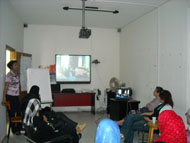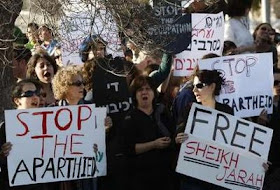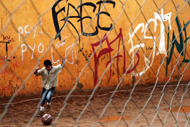Al-Ayyam (Opinion)
February 3, 2010 - 12:00am
ATFP original translation
In the 2/1/2010 issue of Yediot Ahronot, Alex Fishman, known for his close ties to the Israel national security apparatus and often represents their point of view, articulated an emerging Israeli opinion. In an article entitled “Salam Fayyad: The quince turns into a bitter lemon,” Fishman writes:
“Through the years the security apparatus in Israel has dealt with Palestinian Prime Minister Salam Fayyad as though he is a delicate quince. He is an educated, moderate man and, like a quince, not particularly charismatic but suddenly he has become a lemon, bitter as a curse. What a disappointment and a slap in the face for the Israelis. This man has been gaining in stature. He operates independently of our Israeli plans since he is both willful and powerful. Together with Abu Mazen, they have succeeded in eliminating chaos and providing personal security for the Palestinian people by putting an end to the threats of lawless, masked men. For these reasons, Europe and The United States have been giving money to the Palestinian Authority as he provides them with a sense of transparency, cleanliness and accountability. He has started building governing institutions. In cooperation with Abu Mazen, he has damaged Hamas’ propaganda machine in the West Bank and some of its military network. He has started to develop the economy. He also has started to annoy us globally. He is actually going ahead with his plans despite us. He wants to build more cities in the West Bank and is asking us to give the Palestinian Authority more of areas B and C. He is also asking for land in the Jordan Valley to establish villages and farms for the Palestinians. And he has more such plans up his sleeve. And the world seems to get it. All sorts of countries are asking Israel to give the Palestinians more goodwill gestures and more concessions. And all this is happening outside the framework of the peace negotiations. This ability of his to convince the world is driving us crazy.”
Fishman concludes his article, “In Israel, the fear is that at this rate Fayyad will be able to extract from the United Nations a resolution to establish a State of Palestine along the 1967 borders with its capital in Jerusalem without any negotiations with Israel.”
This is Salam Fayyad: independent and nationalistic, capable of imposing his presence and accomplishments. There are several reasons for this.
First is the confidence and trust that President Mahmoud Abbas has in him. Without this confidence, Abu Mazen would not have chosen him over other independents and party members to form the government. When Hamas launched a successful coup in Gaza, it seemed like the PA could not hold its own against the Hamas militias. Abu Mazen’s choice has proven wise and correct. Thanks to Salam Fayyad’s management and governing program all the fears about Hamas coming to power in the West Bank as they did in Gaza have been put to rest.
Second, Fayyad has been able to put together a coalition government composed of most of the active political forces in the West Bank. This provided for a stable government as it is the government of the Palestine Liberation Organization and is its instrument and executive branch on the ground. This government is composed of Fatah at the level of the Central Committee and the Revolutionary Council. It also has a wide representation of the progressive forces, the Democratic Front, Fida, the Nidhal Front, a robust representation from the Palestinian people and many qualified independents. The representation of all those political forces in Fayyad’s government is very important and cannot be underestimated for it is the legitimizing principle for this government. That, together with the trust of the President, make up for the absence of parliamentary legitimacy, which is lacking due to the unilateral coup by Hams and the inability to convene the Legislative Council due to obstruction by both Israel and Hamas.
Third, the international community has great respect for the Prime Minister and for the performance of his government. The clarity, transparency and the absence of cronyism and corruption in the government have solidified the trust that they have in him. They are always willing to consider his requests and to find ways to implement them.
Fourth, consider the achievements of the Prime Minister on the ground. He managed to end the financial boycott that was imposed on the PA and to cover its needs without liquidating any of its national assets or abandoning the rights of its people. Fayyad’s three main achievements have been solving financial problems by generating needed jobs and services, providing for the security of the citizens by putting an end to lawlessness, and developing the economic infrastructure. These accomplishments have realized their guiding principle, which is respect for the citizens and their persons, choices and needs, while keeping intact their political and national rights and their aspirations for freedom. This is a tough proposition under occupation. In other words Fayyad has made practical and national strides without making a single mistake that either Fatah or Hamas could hold against him.
Therefore, the government of Salam Fayyad has earned the respect of its people and the trust of its political forces. It has also caused Israel to worry without being able to condemn his efforts. It is pushing the Palestinian position forward under the correct policies of President Abbas. Over time, this approach is guaranteed to catch up with Israel.











































Israel has been freely building settlements all through out the illegally occupied territories for decades & Palestinian American activists heading supposedly pro-Palestine organizations here in America are inspired to diss a Palestinian effort to build a Palestinian community in Palestine for Palestinians?!!
Knocking support away from Palestine is easy as can be, and apparently many 'academics' find it entertaining to do so... but I find such an approach horrifying because I know beyond the shadow of a doubt that the children of Palestine need real hope- and a real Palestine.